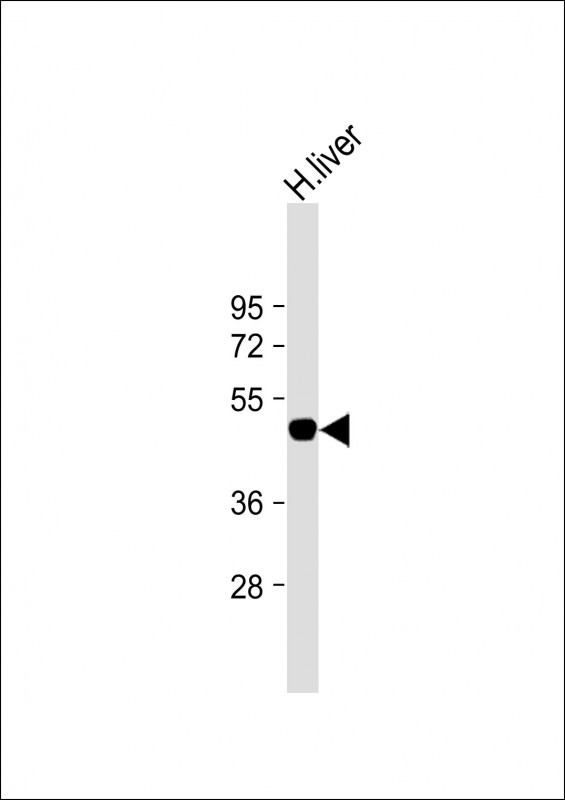
| WB | 1/2000 | Human,Mouse,Rat |
| IF | 咨询技术 | Human,Mouse,Rat |
| IHC | 咨询技术 | Human,Mouse,Rat |
| ICC | 技术咨询 | Human,Mouse,Rat |
| FCM | 咨询技术 | Human,Mouse,Rat |
| Elisa | 咨询技术 | Human,Mouse,Rat |
| Aliases | Zinc transporter ZIP14, LIV-1 subfamily of ZIP zinc transporter 4, LZT-Hs4, Solute carrier family 39 member 14, Zrt- and Irt-like protein 14, ZIP-14, SLC39A14, KIAA0062, ZIP14 |
| Entrez GeneID | 23516 |
| WB Predicted band size | 54.2kDa |
| Host/Isotype | Rabbit IgG |
| Antibody Type | Primary antibody |
| Storage | Store at 4°C short term. Aliquot and store at -20°C long term. Avoid freeze/thaw cycles. |
| Species Reactivity | Human |
| Immunogen | This SLC39A14 antibody is generated from rabbits immunized with a KLH conjugated synthetic peptide between 29-58 amino acids from the N-terminal region of human SLC39A14. |
| Formulation | Purified antibody in PBS with 0.05% sodium azide. |
+ +
以下是关于SLC39A14(N-term)抗体的参考文献示例(内容基于公开研究整理,可能需核实具体文献):
1. **"SLC39A14 regulates cellular zinc homeostasis through lysosomal-mediated storage"**
- **作者**: Jenkitkasemwong S. et al.
- **摘要**: 研究利用SLC39A14(N-term)抗体验证蛋白在细胞内的定位,发现其通过调控溶酶体锌储存参与细胞锌稳态,缺失导致锌代谢紊乱。
2. **"The metal transporter SLC39A14 contributes to neuronal injury in Parkinson’s disease models"**
- **作者**: Chen P. et al.
- **摘要**: 通过Western blot(N-term抗体)证实SLC39A14在帕金森病模型中高表达,促进铁积累并加剧神经元损伤,提示其作为治疗靶点潜力。
3. **"SLC39A14 deficiency alters manganese homeostasis and excretion"**
- **作者**: Aydemir T.B. et al.
- **摘要**: 利用SLC39A14-N端抗体构建基因敲除模型,发现该蛋白对锰的肝肠循环至关重要,其缺失导致锰毒性蓄积。
4. **"ZIP14 is a key mediator of non-alcoholic fatty liver disease via zinc-dependent regulation of lipogenesis"**
- **作者**: Hojyo S. et al.
- **摘要**: 通过免疫组化(N-term抗体)证明SLC39A14(ZIP14)在肝细胞中调控锌水平,影响脂质代谢通路,与脂肪肝发病机制相关。
建议通过PubMed或Google Scholar检索具体文献验证细节。
The SLC39A14 (N-term) antibody is a research tool designed to detect the N-terminal region of the solute carrier family 39 member 14 (SLC39A14) protein, also known as ZIP14. This transmembrane protein belongs to the ZIP (Zrt-/Irt-like protein) family, which regulates cellular uptake of divalent metal ions, particularly zinc, iron, and manganese. SLC39A14 plays a critical role in maintaining systemic metal homeostasis, influencing processes like hepatic zinc storage, intestinal iron absorption, and manganese metabolism in the brain.
Mutations or dysregulation of SLC39A14 are linked to disorders such as Parkinson’s disease, hemochromatosis, and hypermanganesemia. The N-terminal domain is essential for metal ion transport activity and protein localization. Antibodies targeting this region are commonly used in Western blotting, immunohistochemistry, and immunofluorescence to study SLC39A14 expression, tissue distribution, or disease-associated alterations. They help validate gene silencing/overexpression models or assess protein levels in clinical samples.
Most SLC39A14 (N-term) antibodies are raised in rabbits or mice using synthetic peptides corresponding to the protein’s initial 50-100 amino acids. Specificity is confirmed via knockout controls or peptide blocking assays. Researchers utilize these antibodies to explore SLC39A14’s role in metal-related pathologies, metabolic diseases, or neurological conditions, providing insights into therapeutic targeting of ion transport pathways.
×